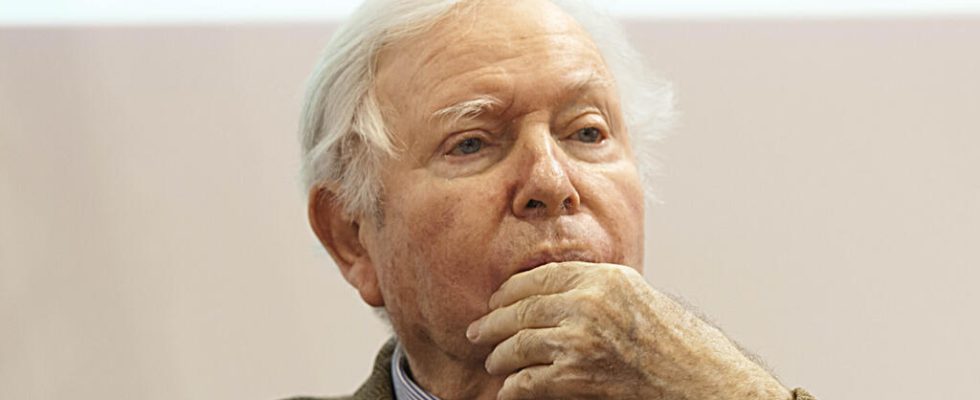Professor of African literature, literary critic, head of collections, Jacques Chevrier has just died. He will be missed by many people, especially his students, to whom he was able to transmit the magic of words and the passion for literary things. The announcement of the disappearance of the great professor fell last week and his burial took place this Monday, September 5 in the family vault in Brittany.
4 mins
Aged 89 and suffering from many illnesses related to old age, Professor Jacques Chevrier passed away on August 29th. Emeritus professor at the University of Paris IV – Sorbonne where he was in post between 1997 and 2003, holder of the chair of French-speaking studies, the man was a great figure in the French university.
He was one of the most eminent specialists in the African literary field, which he made known, radiated and established as an object of study through his teachings and his publications. He was an academic unlike any other because he was also an excellent popularizer, who, alongside his teachings, wrote in the media, particularly in World and to Young Africaintroducing the general public to the works of rising African authors as well as the classics.
Precursor
Born on August 22, 1934, in Paris, Jacques Chevrier was a former student of the École Normale Supérieure of Saint-Cloud, agrégé in modern letters and a Doctor of State. His doctorate focused on the work of the Mauritanian author William Sassine whom he had met during his wanderings in Africa. His title : ” William Sassinewriter from the margins”.
The academic was passionate about Africa, which he had discovered during the colonial wars. Resolute anti-colonial, militant against the war in Algeria, he was keen to make the voices and claims of the colonized heard. In Africa, perhaps more than elsewhere, these voices have made themselves heard through literature, as evidenced by the famous “negritude” movement embodied by Senghor in Africa and Aimé Césaire in the French West Indies.
Entering teaching in the 1960s, Jacques Chevrier was part, with Liliane Kesteloot, Alain Ricard, Bernard Mouralis, Daniel Delas and a few others, from the first generation of teachers of African literature, who worked to make their field of specialization an object of university study. He was part of the team of precursors “, in the words of Boniface Mongo-Mboussa, literary critic. And like any precursor, he spent a large part of his university career “clearing” the ground.
In an interview granted a few years ago, the person concerned had recounted the numerous intellectual reluctance and bureaucratic obstacles he had had to overcome while trying to set up a course in African literature at the University of Rouen, in the aftermath of the events of May 1968.” I took advantage of this climate of cultural revolt, he explainedto shake up university habits, create the department and offer students an introduction to French-speaking literature. ” His fight consisted at the time, he liked to tell, to have the literary dimension of the works produced by Africans recognized, ” assimilated to anthropology or sociology “.
Chevrier led this fight at university, but also through a series of books, the best known of which is undoubtedly Negro literature, published in 1974. A historical essay on the conditions of emergence and the creative fecundity of African literature, the work has established itself as a sort of “Lagarde and Michard” of the African Francophonie and has been a success since its first publication. constant with African and European readers. Reissued many times, enlarged, Negro literature served as a reference for several generations of students.
A protean action
We will not have said everything about the protean action of Jacques Chevrier in favor of the promotion of literary Africa without writing a few words about his involvement in the institutional reception of African literary works and authors. “Man of networks”, as Boniface Mongo-Mboussa says of him, Chevrier had been able to mobilize and make use of the institutions of the Republic, including the Elysée, in the service of the influence of French-speaking literature from black Africa. According to legend, it was President François Mitterrand himself, solicited by his secretary Paulette Decraene, who gave the green light for the journal Literary and artistic Africalaunched and directed by Jacques Chevrier, is financed by the Cooperation.
Jacques Chevrier was also at the origin of the prestigious literary Grand Prix of black Africa, nicknamed the “African Goncourt”, awarded since 1961, and of the Ahmadou Kouroumacreated in 2004, and awarded annually at the Geneva International Book and Press Fair.
These prizes, which give visibility to writers, as well as the books and articles signed by the late professor, as well as the courses in African literature that he taught in the universities of France and Navarre for decades, testify to the conviction repeatedly affirmed by Jacques Chevrier: ” Do literary exchanges not remain the preferred form of dialogue between cultures? It is moreover with this affirmation, proclaimed in a rhetorical form, that Negro literatureL’magnum opus by Professor Chevrier.
